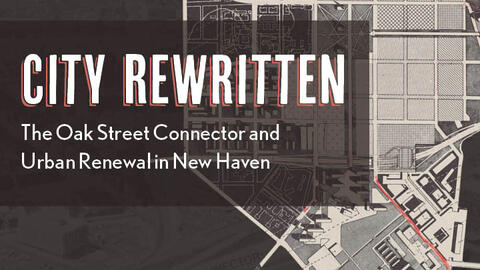City Rewritten: The Oak Street Connector and Urban Renewal in New Haven

“City Rewritten: The Oak Street Connector and Urban Renewal in New Haven” explores the effects of the formative era of urban renewal on New Haven’s urban landscape and social history. Urban renewal was a progressive vision aimed at revitalizing a city’s economy, beautifying the urban landscape, removing residents from substandard living conditions, and promoting racial integration. However, historians and urban planners have largely viewed the policy as a failure, one that disproportionately displaced impoverished Black people and reinforced patterns of segregation.
From the mid-1950s to the early 1970s, New Haven embarked on a particularly ambitious urban renewal program that completely remade the city’s downtown and affected most of its poorer neighborhoods. Diving into Yale special collections from New Haven city government as well as community organizations and oral histories, this exhibit explores New Haven’s very first urban renewal project—the Oak Street Connector—as a case study for urban renewal’s utopian vision, its complex politics surrounding civic representation, and its destructive impact on New Haven residents.